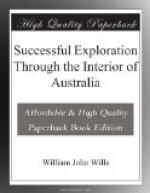We are at Deniliquin. And where in the world is that? you will say. Well; it is about two hundred miles north from Melbourne, on the Edward River, in the New South Wales district, and nearly five hundred miles from Sydney. The station belongs to the Royal Bank Company. We have engaged as shepherds at 30 pounds per annum each, and rations. We are very comfortable, in a hut by ourselves, about four miles from the station. We have between thirteen and fourteen hundred rams, by far the smallest and easiest flock, under our charge. We take the hut-keeping and shepherding in turns. The hut is a very nice one, built of split wood, and roofed with bark. It is close beside a pleasant creek or river, where there are plenty of fish and ducks. I assure you we make ourselves quite snug here. One of us rises almost as soon as it is light, gets some breakfast, and starts off with the sheep; lets them feed about until ten o’clock, then brings them slowly home, where they lie down until four; after that, they go out again until sunset. The other stays within to clean up the hut and prepare the meals. We can kill a sheep when we like. [Footnote: Not the rams. There were a few others kept for the purpose. I stayed a few days with them, when I went out myself, at the end of the year.] The worst part serves for the dogs, of which we have three—a sheep dog, and two kangaroo dogs. [Footnote: They had a horse when I visited them, but not, I conclude, at the time when this letter was written.] The latter are good, and keep off the native curs at night. The sheep dog was the only one the former owner had last year, to watch a flock of five thousand sheep.
But you will want to hear something of Melbourne and how we came here. The first discovery we made after we got into port was, that we had to take ourselves and things ashore at our own expense. There was a good deal of fuss made about it to no purpose. It was four shillings each by steamer to Melbourne, and thirty shillings per ton for goods. It cost us about 2 pounds altogether. At Melbourne we found everything very dear; no lodgings to be had, every place full. At length we were offered lodgings at sixty shillings a week, to be paid in advance, and twenty-five persons sleeping in the same room; but we preferred the Immigrant’s Home, a government affair, just fitted up for the accommodation of new-comers, where you pay one shilling a night, and find yourself. You must not stay more than ten days. We got there on Friday and remained until the Saturday week following. We then obtained this situation, and started on the same afternoon. Twenty-three of us came up together. Drays were provided to carry our luggage, but we ourselves had to walk. We were three weeks on the journey, through the bush, sleeping, of course, in the open air.
. . .
He then proceeds to describe Melbourne, as it then was:—




